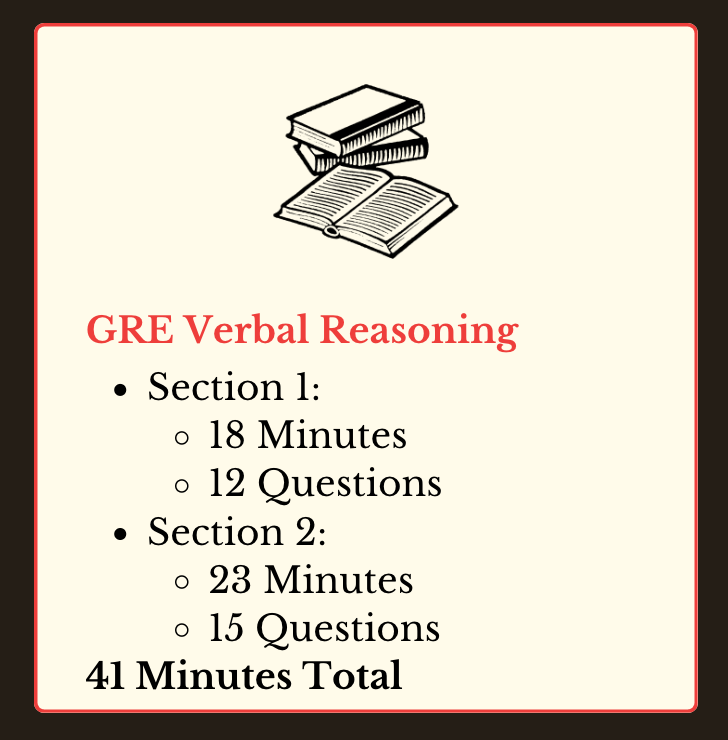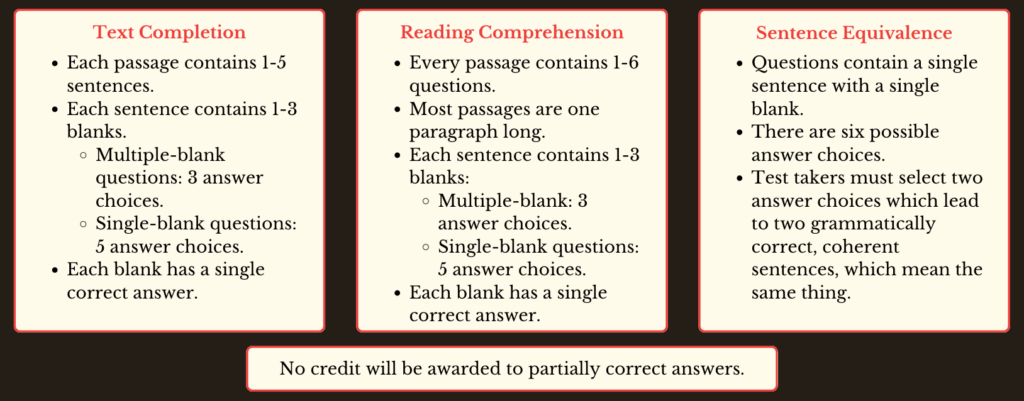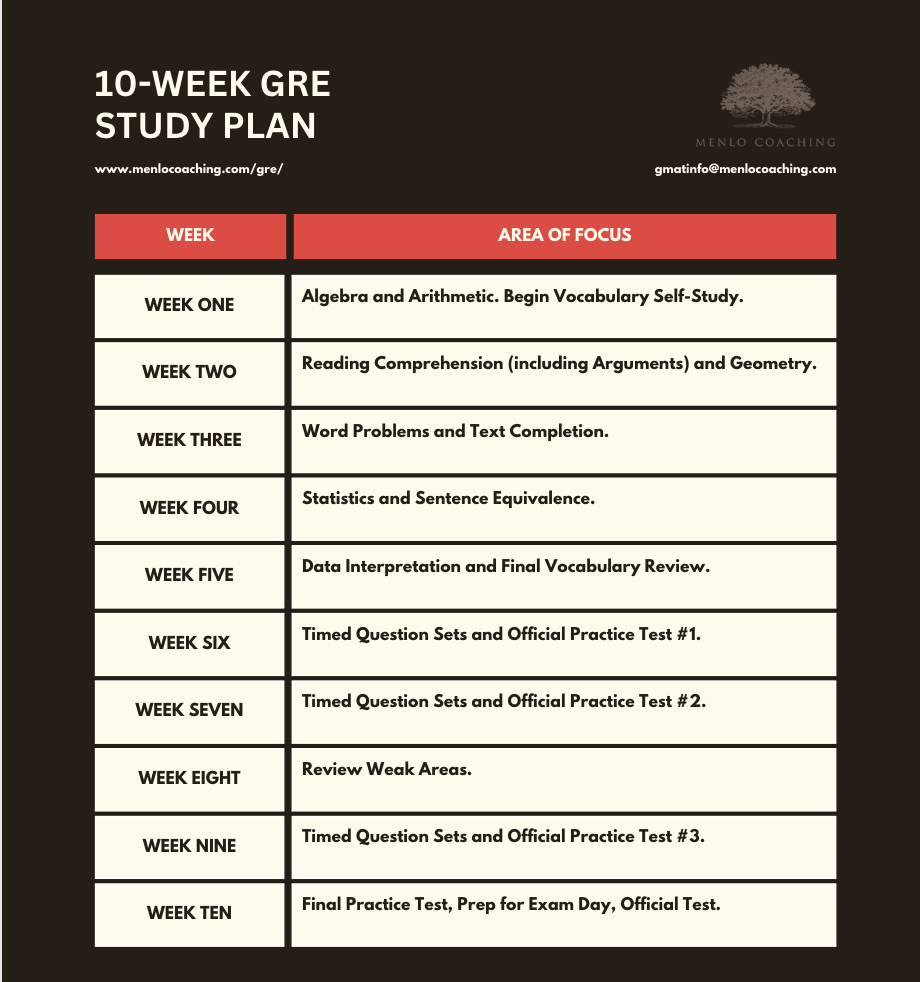Verbal Reasoning is one of three sections in the GRE, alongside a Quantitative Reasoning section and an Analytical Writing section. Compared to similar sections on the GMAT and other graduate-level entrance exams, the Verbal Reasoning section of the GRE is quite complex and difficult to prepare for.
A high GRE Verbal Reasoning score is necessary for many graduate programs, including MBA programs at competitive business schools. However, a high GRE verbal section score is often an entry requirement for graduate programs that prioritize Verbal Reasoning skills over analytical or quantitative proficiency, like English and the Social Sciences.
This article was written with these readers in mind—so if you’re looking to maximize your GRE Verbal Reasoning score for graduate school admission, you’ve come to the right place! We’ll delve into the structure of the Verbal Reasoning portion of the GRE exam, the types of questions asked within this section, and strategies for mastering GRE Verbal Reasoning.

The Verbal Reasoning and Quantitative Reasoning sections of the GRE are both subdivided into two further sections each.
The GRE Verbal Reasoning section totals 41 minutes. Its subsections last as follows:
The GRE is section-level adaptive, so your performance in section one of the Verbal Reasoning section will determine the difficulty level of the questions in the second verbal section. Your total Verbal Reasoning score will be based on the total number of correct answers you get as well as the difficulty level of those questions.
The GRE allows test takers to skip and return to questions within a given section of the test.
There are three types of questions in the Verbal Reasoning measure of the exam:
Roughly half of the Verbal Reasoning measure requires test takers to read passages and answer questions based on those passages of text.
In the other half, test takers are required to read, understand, and fill in existing sentences, groups of sentences, or paragraphs.
Below, we will discuss these types of questions and identify strategies for improving.
The text completion questions on the GRE purport to assess a test taker’s ability to interpret and evaluate written material based on partial information. ETS states that skilled readers do not just absorb information: they can “create a picture of the whole” and revise that picture as they go, based on the information available.
Text completion questions test this ability by asking test takers to fill in crucial words or short phrases, based on the information available in the rest of the passage, and create a coherent whole.
Students with a clear, broad understanding of advanced college-level English vocabulary and those who develop the ability to correctly identify subtle—yet important—differences in overall sentence structure and meaning will have the greatest success on GRE text completion questions.
Each passage of text consists of one to five sentences, and there can be anywhere between one and three blanks in a sentence.
If there are multiple blanks, each blank will be given three answer choices.
If there is a single blank, there will be five answer choices.
Each blank has a single correct answer.
The answer choices for different blanks are completely independent, so selecting one answer choice for one blank doesn’t affect the answer choices available to you for another blank.
No partial credit will be given, so answers must be completely correct.
GRE test takers who struggle with text completion often falter at the same hurdles: timing, disorganization, and a lack of proper exam strategy. These issues can be easily overcome with the right instruction and the strategic use of official GRE practice questions.
In order to improve, test takers should keep the following advice in mind:
By following these steps, you should see the results in your final score.
Reading comprehension questions on the GRE are designed to measure a test taker’s abilities to read and interpret a standard of writing that is common at graduate-level education.
ETS lists the following abilities as being crucial to a test taker’s success with reading comprehension questions:
ETS maintains that a passive understanding of the words and sentences in a passage of writing is no guarantee that the reader has accurately interpreted the meaning of the text. As a result, reading comprehension questions task readers with actively engaging with the text, asking questions, formulating and evaluating hypotheses, and considering the relationship of the words and sentences to other texts and information.
Somewhere around half of the questions on the test are based on passages, and every passage has between one and six questions related to it. The majority of passages are one paragraph long, although a small number (1–2) can be several paragraphs long.
These passages are pulled from academic and nonacademic sources, primarily books and periodicals, and can cover any of the following topics:
No specialized knowledge of any of these topics is required, and all questions are answerable based on the information available in the passage. For this reason, GRE takers will not need to
There are 3 question types:
These multiple-choice questions offer five possible answer choices of which there is only one correct answer.
These multiple-choice questions offer three answer choices offer three answer choices, and test takers must select all that are correct. Any number of these choices could be correct: just one, two, or all three. Partially correct answers will be provided no credit.
Select-in-Passage reading comprehension questions require test takers to click on the sentence in a passage that matches a given description. In order to answer the question, test takers choose one of the sentences and click on it. You can highlight the correct sentence by clicking on any part of that sentence.
It’s almost a cliché at this point, but the most effective way to improve in GRE reading comprehension is to read! Read books, articles, and blogs broadly and often to make consistent improvements
The reading comprehension questions on the GRE serve to evaluate your critical reading skills in relation to graduate-level texts, so the texts have a level of complexity that you will be exposed to throughout grad school.
It’s advisable to read a wide variety of texts at this level of difficulty on a regular basis before the GRE or, at least, for an ongoing period of time in advance of your exam.
ETS recommends reading articles from newspapers like The New York Times and periodicals including The Economist, as well as sampling texts from academic journals, such as The Royal Society. Many of these articles and papers are open access.
Further, how you read is as important as what you read, so ETS advises developing the habit of closely and critically engaging with the text, focusing on paragraphs that seem especially information-dense.
ETS offers some examples of questions you can use to guide your critical reading:
Beyond reading widely and closely, some other strategies can help you improve your GRE score:
Working on reading comprehension practice questions with these strategies in mind should put you right on your way to improving your GRE verbal score.

Like text completion questions, sentence equivalence questions test your ability to come to correctly complete a given passage based on the limited information available. However, sentence equivalence questions have a greater focus on the meaning of the completed whole compared to text completion questions.
Sentence equivalence questions consist of a single sentence with a single blank. Test takers are asked to choose two options that will produce complete, grammatically correct sentences which mean the same thing.
Sentence equivalence questions follow the structure below:
One of the most common mistakes GRE takers make with sentence equivalence questions is looking for synonyms among the answer choices.
This can be misleading for a couple of reasons.
Instead, take the time to read the sentence properly and get a sense of its meaning.
Identify important words and phrases that
a) emphasize the structure of the sentence, like “despite” and “furthermore”; and
b) contain the key for understanding the overall meaning of the sentence.
Fill in the blank with a word or phrase that seems appropriate to you before checking the answer choices to see if two similar options are offered. However, if you find a word similar to what you’re expecting but can’t find two appropriate options, try not to become fixated on your personal interpretation. Search for other options that can be used to fill the blank coherently.
When you’ve selected your answers, double-check that each one produces a logical, grammatically and stylistically coherent sentence and that both sentences mean the same thing.
Reading appropriate GRE-level texts from newspapers, periodicals, and academic journals is possibly the most effective way to prepare for GRE Verbal Reasoning.
High-level reading serves the dual purpose of making you a more critical and engaged reader, searching for meaning in sentences where you might not understand all of the vocabulary or surrounding context while improving your graduate-level vocabulary.
However, reading advanced materials more often will take time, and it isn’t always possible to make quick improvements in your GRE verbal performance by reading alone—particularly in the run up to your test date.
Working with GRE Verbal Reasoning practice questions and practice exams is the most effective and efficient way to prepare you for the exam.
Working with practice questions and practice tests allows GRE students to recognize patterns that appear in the GRE verbal section and avoid making the same mistakes repeatedly. While reading broadly and often can improve your knowledge base, using official GRE verbal practice tests and questions is the only way to apply this knowledge in a way that accurately prepares you for the exam. However, there are only a limited number of GRE practice tests and practice questions available for students, so the strategic use of these resources is absolutely necessary.
At Menlo Coaching, our GRE curriculum is built around the strategic, exclusive use of official GRE materials to allow our students to achieve their target GRE scores without wasting time.
Studies have proven that students who vary their preparation methods have the greatest success on test day.
We recommend incorporating diversity into your study methods to prepare for test day. Consider using GRE practice questions, flashcards, and practice tests (sparingly and strategically). Try to teach the material to another person. Watch tutorials and join group courses to learn from other test takers—and their mistakes!
Using the official GRE prep books sold by ETS is a great way to start, but top GRE scorers don’t rely on rote memorization to prepare for the GRE!
One of the greatest challenges of the GRE verbal section is the vocabulary being tested. Improving one’s vocabulary over a short period of time is a tall order, particularly if you’re relying on guesswork to inform what kinds of words are used in the GRE.
Fortunately, at Menlo Coaching, we’ve compiled a database of 200+ GRE vocabulary words that have come up in previous exams, indexed based on how frequently they appear in official GRE exams.
This is an invaluable resource for GRE students—particularly those in a time crunch who want to make significant improvements to their overall GRE score in a short window of time.

The GRE Verbal section is a significant challenge for those looking to progress into graduate-level education. The Verbal Reasoning portion of the exam tests more than just your command and understanding of the English language: It is similarly interested in your ability to reason and evaluate material based on partial information.
There are three types of questions in the Verbal Reasoning section of the GRE:
In order to improve your GRE Verbal Reasoning score, you should
Students can make strides to improve their GRE verbal score independently, but working with an experienced GRE tutor can help students make the most efficient progress towards their target scores.
At Menlo Coaching, our GRE tutors work exclusively from official GRE materials, meaning you won’t waste time learning irrelevant material or drilling inaccurate practice questions. Instead, our tutors teach you only relevant concepts and material, the traps and pitfalls test takers commonly fall into, and strategies for answering questions efficiently.
Furthermore, because our tutors cultivate a tailored plan for every student, you can work with your GRE tutor on the verbal section alone, rather than dividing your time among Verbal Reasoning, Quantitative Reasoning, and Analytical Writing.